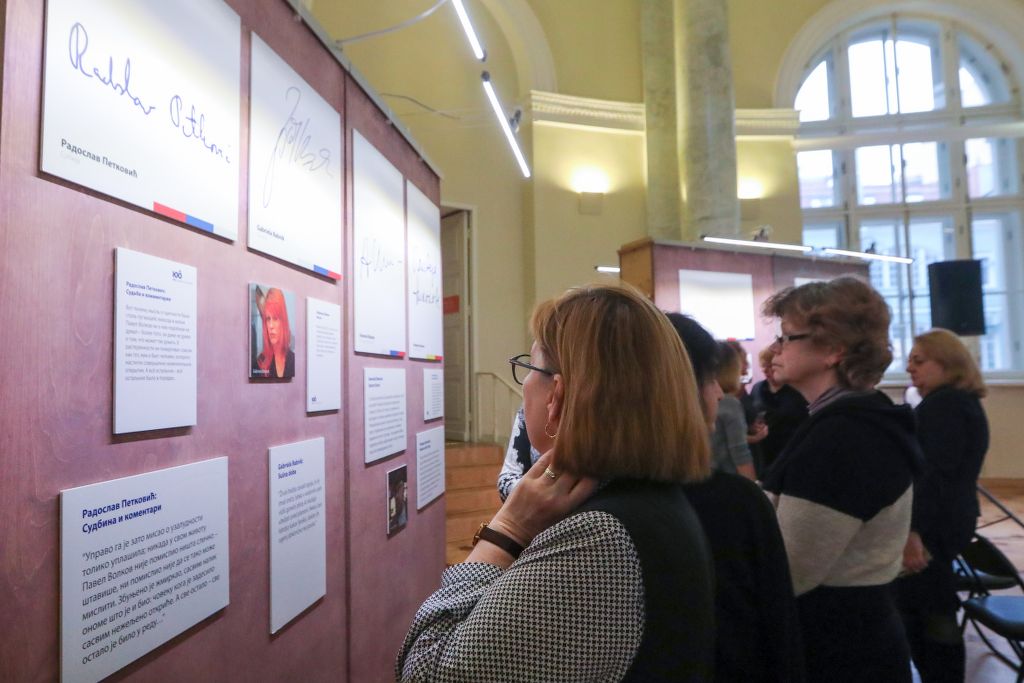The Universe of Slavic Literature
One of the features of the Forum of Slavic Cultures programme in the Russian capital was Slavic literature, its authors and the exhibition 100 Slavic Novels, as well as the women writers’ cultural route.
In the State Hermitage Museum, one of the main venues of the VIII International Cultural Forum in St. Petersburg, the FSC set up a readers’ corner – a space where visitors were introduced to contemporary Slavic novelists through the books from the 100 Slavic Novels collection in their different language versions.
The Vladimir Mayakovsky Central City Library was the venue for the exhibition 100 Slavic Novels, and live readings attracted a number of visitors as well. The featured authors were Aleksandar Gatalica from Serbia, Jani Virk from Slovenia and Russian novelist Yevgeny Vodolazkin. The exhibition was opened by Vladan Vukosavljević, Serbian Minister of Culture and Media. On this occasion, the FSC donated 200 books from the 100 Slavic Novels collection to the Russian State Library. Andreja Rihter, FSC Director, handed over the symbolic donation to the library’s general director Vadim Duda.
The 100 Slavic Novels project was also the subject of the round table titled “The Universe of Slavic Literature”, in which the participants Dubravka Đurić Nemec, advisor to the Minister of Culture of the Republic of Croatia, Andreja Rihter, Director of the Forum of Slavic Cultures, Renata Zamida, Director of Slovenian Book Agency, Serbian author Aleksandar Gatalica, Marianna Bershadskaya, translator and professor at St. Petersburg State University, the collection’s editor in chief, Mladen Vesković of the Ministry of Culture and Media of the Republic of Serbia, Gojko Božović of Serbian publishers Arhipelag, and Silvia Stasselova, General Director of the University Library in Bratislava, discussed the role of communication between authors and translators. The round table was moderated by Anna Starominskaya, journalist at Radio Sputnik. The speakers agreed that the collection was an important contribution to international dialogue as translations are not only about languages and words, but first and foremost about dissemination of cultures. The 100 Slavic Novels project therefore represents a milestone in the translation of Slavic literatures after the fall of the Berlin Wall. Author Aleksandar Gatalica added that the Slavic people simply have to seek opportunities to read each other.
Another project that contributes to the efforts in getting to know and cooperate with each other is the Women Writers’ Route. This was the focus of the conference “Cultural Routes of the Slavic World on the Map of Europe”. The project was presented by FSC’s Director Andreja Rihter, with Ankica Puškarić, President of the Programme Council of the new cultural route and Director of Ivana’s House of Fairy Tales from Ogulin, Croatia, and Biljana Dojčinović of the University of Belgrade, member of the Programme Council, offering their view on the partnership in the project and the progress of its activities. The conference was led by Deputy Minister of Culture of the Russian Federation, Alla Manilova, and head of the agency Rossotrudnichestvo Eleonora Mitrofanova. The speakers featured the ministers of culture of Serbia and North Macedonia, and representatives from Croatian and Slovak ministries of culture, and representatives of Russian regions also attended the conference.
The Universe of Slavic Literature

